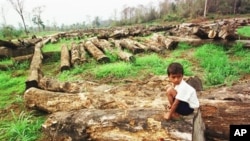Cambodia’s woodlands are seeing continued deforestation, despite a plan by the government to curb illegal logging, environmental groups say.
Authorities say they have a plan to protect the forest, but non-governmental groups say the problem persists, including through an increase in land concessions, and massive illegal logging by the military.
Cambodia has an official strategy to protect the forests over the next 18 years, including land management practices and tighter governmental controls over still exiting forests. Experts say as little as 30 percent of the country’s forest cover remains, while logging continues to be a problem.
George Boden, a deforestation expert for Global Witness, which was ejected from Cambodia in 2005 after detailed reporting on corruption and illegal logging, said the practice has continued.
Officials close to Prime Minister Hun Sen have sold off forests for their own benefit in an ongoing practice, he said. Global Witness reported in 2007 that a kleptocratic elite continued to earn riches by selling off forestland.
However, Than Sarath, a management official at the Ministry of Agriculture, Forestry and Fisheries, said the government has six programs to protect the forests. Part of that includes putting money that forests earn back into their own protection, he said. There are also plans to sell carbon credits, he said.However, villagers remain unconvinced.
Svay Poun, 50, a villager in Preah Vihear province’s Roveng district, said he was dubious of government efforts, following a series of concessions in Prey Lang forest, a vast stretch of woodlands that spans four provinces in east and north of the country.
Villagers there say their livelihoods have been threatened by rubber plantation concessions to companies that have not followed regulations to protect the forest.
“A plantation is not the same as a forest,” said villager Chun Yin, who lives in Kampong Thom province. “As we see it, when will the trees grow again? It doesn’t have animals, fruit or vegetables, or growth from the old generations.”
Demand for Cambodia’s high-quality timber comes from China and Vietnam, according to environmental experts.
Chut Vuthy, president of the Natural Resource Conservation Group, said timber must either be transported by road, or shipped. That means it has to cross checkpoints.
For Vietnam, the Doung checkpoint in Kampong Cham province sees up to 12 trucks a day cross with illegal timber, he said, while ships to China leave from ports in Koh Kong and Preah Sihanouk provinces. The Cardamom Mountains remain a main source of such timber, experts said, especially in Pursat province.
Than Sarath said legal logging revenue was part of the national budget, but he declined to confirm the amount.
Along the Thai border, meanwhile, illegal logging has increased since tensions escalated between Thailand and Cambodia over Preah Vihear temple in 2008, villagers say.
A former truck driver, who spoke on condition of anonymity, said he drove trucks for top military officials in the province, as well as members of Hun Sen’s bodyguard unit.
Valuable timber is cut from the forest and stored at military headquarters in the province, he said. No one is allowed to enter the compound because of national security, he said.
Every month, he said, military officers issue orders to lower ranking soldiers to cut trees in the jungle.
“After they cut the trees, they transport them to the military headquarters, about 20 kilometers from Preah Vihear,” he said. From there they are shipped to Kampong Cham and Vietnam, he said.
A villager in Preah Vihear province, who asked not to be named, said the practice continues. He counts four or five trucks a night. Trucks go up carrying soldiers and come down carrying timber covered up with tarpaulin, he said.
“The relevant authorities are afraid to stop those trucks, because they fear losing their positions,” he said.
Chut Vuthy said five to six major smuggling operations are still underway in the country.
“We have all kinds of laws to protect natural resources, but from day to day, the forest is still decreasing,” he said.





